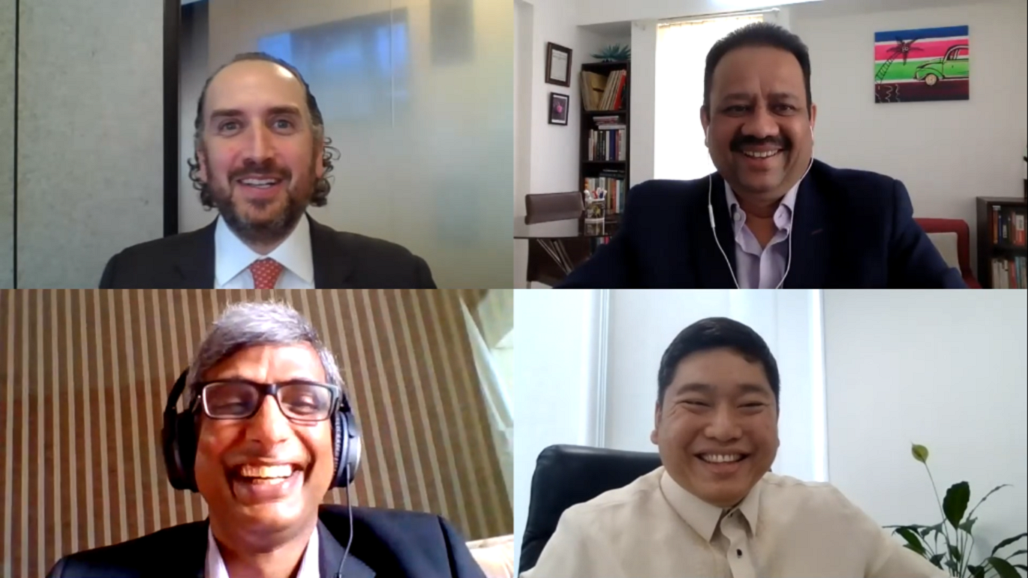![]() The webinar on “Future-proofing your Financial Crime Compliance Screening” held on April 7 2021 gathered more than 640 registered participants from over 30 countries and territories from around the globe. Jointly organized by Fintelekt Advisory Services and the Asian Bankers Association, the webinar represents another successful joint effort as part of a series of webinars to be held throughout 2021.
The webinar on “Future-proofing your Financial Crime Compliance Screening” held on April 7 2021 gathered more than 640 registered participants from over 30 countries and territories from around the globe. Jointly organized by Fintelekt Advisory Services and the Asian Bankers Association, the webinar represents another successful joint effort as part of a series of webinars to be held throughout 2021.
The webinar was moderated by Shirish Pathak, Managing Director, Fintelekt Advisory Services and the speakers were Srinivas Vaman Gollapudi, Joint President and Business Head – Trade Finance and Commercial Operations, Kotak Mahindra Bank; Brent Estrella, Group CCO, Rizal Commercial Banking Corporation; and Douglas Wolfson, Director – Market Planning, FCC & Payments, LexisNexis Risk Solutions.
The speakers discussed the challenges around the current regulation and compliance frameworks designed to combat crime and their impact on customer onboarding while increasing false alerts and operational costs, therefore having a negative impact on the customer experience.
Hereunder is a Summary Report on the webinar:
(1) Douglas Wolfson presented the findings of the True Cost of Financial Crime Compliance study by LexisNexis Risk Solutions.
The objectives of the study were to identify the drivers and influencers that impact financial crime compliance, understand spending trends for financial crime compliance, determine the business impact of the financial crime compliance environment, particularly with regard to new regulations and provisions and identify any challenges and impacts associated with the Covid-19 pandemic.
1.1 Key findings of the study were as follows:
- The cost of financial crime compliance has risen significantly for larger financial institutions in key APAC markets, with labour contributing to this.
- KYC for account on-boarding is a key challenge facing larger APAC banks.
- Covid-19 has significantly impacted financial crime compliance operations and costs across APAC financial institutions.
- Challenges aside, financial crime compliance activities do provide a range of benefits to APAC financial institutions, allowing more effective risk management and management of customer relationships.
- Financial institutions which have invested in technology solutions to support financial crime compliance efforts have experienced smaller cost increases, lower costs per full-time employee and less negative impacts from Covid-19.
1.2 Implications of the findings for financial institutions in the Asia Pacific (APAC):
- APAC financial institutions need to be extremely prepared for increased risks of financial crime for the foreseeable future.
- Skilled compliance professionals will continue to be in demand, as financial crime grows in complexity. But financial firms should consider fast-forwarding efforts towards compliance technology to counter challenges and costs to compliance operations.
- A multi-layered solution approach to due diligence and financial crime risk assessment is essential to financial institutions.
- In addition to technology, it is essential to have robust and accurate data. Without the support of expanded sources, bad data can lead to bad decisions. Good data can lead to lower risks with benefits to the wider organisation.
“Different legacy systems that are used within financial institutions are forcing more and more manual work. There is a need to look at how business is done, to develop processes and develop straight-through processing to build a more efficient system which reduces false positives.” – Douglas Wolfson, LexisNexis Risk Solutions

(2) Key Takeaways from the Panel Discussion
2.1 On the Total Cost of Compliance report:
- A structured view with complying agencies working together may be able to bring down the $12 billion spent on financial crime compliance.
- The report helps industry look at financial crime compliance strategically. In the short run meeting requirements by throwing more warm bodies into work may be a solution but in the long run, technology will have an important role to play in the sustainability of processes and controls in the financial crime compliance programme.
“Collaboration between various institutions – such as financial institution, technology companies, the FIU – will help bring down the cost of compliance and enable a risk compliance culture at a much lower cost.” – Srinivas Vaman Gollapudi, Kotak Mahindra Bank
2.2 On customer screening challenges:
The customer is at the heart of everything that a bank or financial institution does. Other considerations for a bank are:
- Legacy systems and processes, which have been especially pushed to the fore during the pandemic.
- Local screening requirements, which are different across different jurisdictions.
- Reducing false positives, which is a problem with most institutions.
RCBC has embraced digital transformation and onboarded new customers digitally even within the pandemic. For this, the bank has used reliable technology and screening solution providers and has moved of aspects of core banking to cloud.
“RCBC became the first local banking conglomerate to enter into a Public Private Partnership with the Anti-Money Laundering Council in the Philippines with objective to enrich data so that customer and transaction screening can be done more effectively and efficiently.” – Brent Estrella, Rizal Commercial Banking Corporation
2.3 On trade finance screening challenges:
- The FATF framework for trade-based money laundering is based primarily on risk indicators around corporate structures, trade activity and trade transactions.
- The bank must put in place its own processes within this framework provided by the FATF, such as pattern monitoring, monitoring of one-to-many and many-to-one transactions, etc.
- In many Asian countries, regulations and restrictions are already in place for import/export. Products or services that are already controlled by these regulations may require less due diligence than products that are not controlled.
2.4 On the new regulations around Targeted Financial Sanctions in the Philippines
- Philippines is in the post observation following the 3rd round of Mutual Evaluation in 2018 and has introduced new regulations around Targeted Financial Sanctions to improve technical compliance in line with FATF standards.
- So far covered persons (reporting entities) were looking at screening as a customer screening requirement. The new regulation has enabled the focus to evolve transaction screening.
- The challenge for institutions is to add screening around dual use goods, vessels, entities involved in proliferation financing or weapons of mass destruction, payments, trade finance transactions, etc.
- The use of technology, especially automated solutions, will be required in future to address the challenges that this requirement brings.
2.5 On good practices in trade screening
- Remittances for trade usually provide limited data – account number, name of beneficiary and amount that is being remitted when making SWIFT transfers.
- It is left to individual entities to put in place the proper due diligence measures.
- A robust trade KYC, risk-based analysis on products and a separate monitoring system for advance remittances are some of the good practices that institutions can adopt.
(3) Webinar’s video and presentation file:
The recording of the webinar is available at the Fintelekt Academy HERE.
The presentation file can be downloaded HERE.
Registration in the Fintelekt Academy is FREE and more than 80% of the content is FREE to view. Please use it!
(4) Participation Certificates:
Participation Certificates are available to participants who upgrade to Premium membership on Fintelekt Academy upon completion of a multiple-choice assessment.
Paid membership is available to ABA members for US$95 annual subscription – representing a 24% discount from the standard annual subscription of US$125 for ABA non-members. ABA members should write to ABA to get the Discount Coupon.
Paid members of the Fintelekt Academy can apply for Fintelekt-ABA webinars’ Certificates of Participation, at NO EXTRA COST for one year.


Leave a Reply